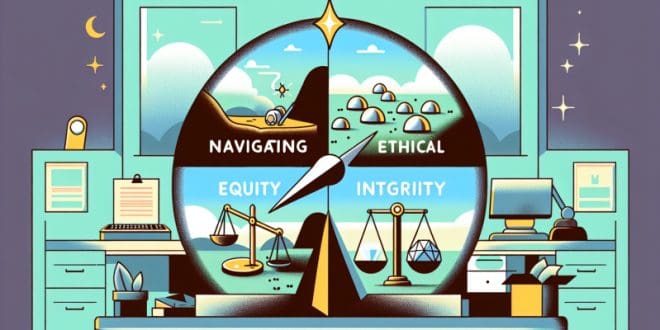The art of grantmaking is not just a financial endeavor; it is a complex ethical journey, one that demands meticulous attention to fairness, integrity, and responsibility. As a seasoned Research Grant Coordinator, I have witnessed firsthand the intricate dance between due diligence and the imperatives of inclusivity.
Philanthropic organizations wield substantial influence over which projects come to life and which initiatives receive the oxygen of funding. This power, however, comes with a substantial burden: the need to navigate the ethical minefield that is grantmaking. With such responsibility, how do we ensure that the process is equitable, and the deployment of funds is as unbiased and transparent as possible?
One of the first steps in maintaining ethical grantmaking practices is the recognition and mitigation of implicit biases. These unconscious beliefs can seep into decision-making processes, invariably affecting which organizations receive support. To tackle this, many forward-thinking foundations are implementing diversity training and establishing review panels that reflect a breadth of experiences and backgrounds. The objective is clear: make the grant review process as inclusive as the communities it seeks to support.
Yet, inclusivity and fairness extend beyond the diversity of the review panel. They are also about the accessibility of grants. It is essential to evaluate whether funding opportunities are communicated through channels that reach a diverse applicant pool. Language barriers, complex application procedures, and restrictive eligibility criteria can all function as inadvertent gatekeepers.
Addressing conflicts of interest is another cornerstone of ethical grantmaking. Transparency is paramount. Clear guidelines must be established to prevent any personal or professional interests from influencing funding decisions. This includes the disclosure of relationships and abstaining from decision-making when necessary, to maintain the integrity of the process.
One must consider the case of a grantmaker who finds themselves reviewing a proposal from an organization where a close friend is the director. The ethical course of action would be to disclose this relationship and recuse oneself from the decision-making process for this particular grant. This is how we safeguard the impartiality and the public’s trust in our grantmaking institutions.
To strengthen ethical frameworks, many organizations are developing comprehensive codes of conduct, rigorous internal controls, and external audits. Beyond these measures, listening to the communities we serve and incorporating their feedback into grantmaking practices is vital. It is through such mechanisms that we can continuously refine our ethical compass.
It is worth examining the ethical considerations that guide the distribution of grants. For example, during crises like natural disasters or pandemics, how do we balance the immediate need for aid with the long-term sustainability of projects? Case studies from these scenarios reveal the difficult choices grantmakers must make, often under great pressure.
As stewards of philanthropic capital, we are tasked with an onerous yet rewarding duty: to distribute funds in a manner that is just and fair. Upholding ethical standards is not merely a compliance requirement; it is a moral imperative which, when executed with care and consideration, can bridge the gap between prosperity and need.
By embracing the complexities of ethical grantmaking, we affirm our commitment to a world where generosity and justice walk hand in hand, creating a vibrant and equitable non-profit sector that can truly flourish. Let us continue this crucial conversation and work together to ensure our practices reflect the high standards we aspire to uphold.
 Grants Club Community
Grants Club Community







